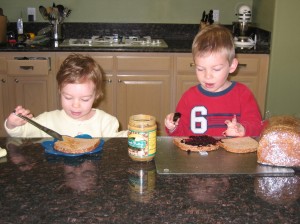I recently read Nancy Carlsson-Paige’s article, “How to raise a grounded, creative child,” which resonated with me for several reasons. I love her thoughts on schools focusing on the whole child. I concur that providing lots of imaginative child-centered play during the early years is essential to development. And I’m not gonna lie – my curiosity as a mother raising two adolescents got the best of me. While I don’t know him personally, I admit I’m a Matt Damon fan. From what I’ve read, I believe him to be a good, down-to-earth guy, who’s worked hard and earned success. So learning that my educational and parenting beliefs are very much aligned with Ms. Carlsson-Paige’s (who happens to be Damon’s mom) gave me reassurance that similar choices my husband and I have been making have proven effective for a parent of now-adults.
Having chosen Montessori education for our children in their preschool and elementary years, and as a professional path for me to follow, I wholeheartedly agree that providing an environment that allows a child to develop all facets of himself encourages a child to thrive. (One of the basic tenets of Montessori philosophy is the focus on the “whole child.”) In addition to learning academics, children need to develop practical life skills, such as conflict resolution and being part of a community. Giving opportunities for choice in school work helps children foster their own interests and develop confidence, knowing that adults trust them to make their own decisions. Integrating artistic endeavors throughout the academic areas of study, whether it be through music, art projects, or drama, addresses various intelligences and encourages deeper learning. While many, if not most, of these lessons can be taught at home, emphasizing them at school can only be beneficial, in my opinion.
Reading that imaginative play was a cornerstone of her sons’ childhoods, I felt affirmed that our choice to allow our children long periods of unstructured free time, both after school and on weekends, through their childhoods thus far had been a choice of another family. While I’m not saying I don’t know other families that do this, I’ve often felt that we are in the minority in this parenting choice. Yes, our kids have participated in various structured activities throughout the years, but we’ve always wanted to make sure that there was ample time to choose whatever struck a chord – whether it be reading, playing imaginative games, cooking, going to the park, or whatever sounded good that day.
I am onboard with Carlsson-Paige’s reminder that we need to advocate for teaching to the whole child, not just the academic component. After all, essentially all information can be found within seconds online now, but being a well-rounded, contributing member of society can not.

